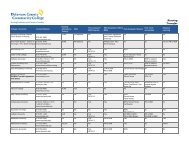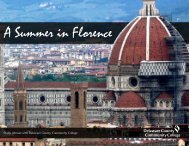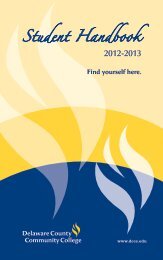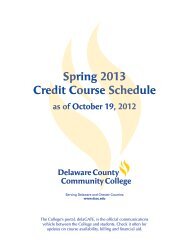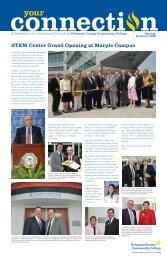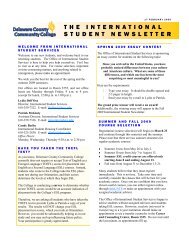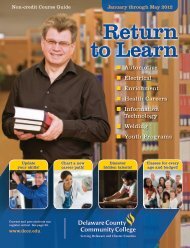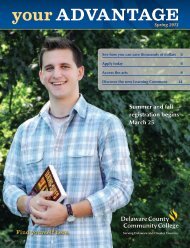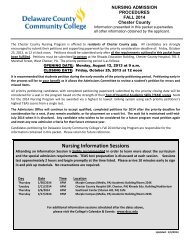2010 Catalog - Delaware County Community College
2010 Catalog - Delaware County Community College
2010 Catalog - Delaware County Community College
Create successful ePaper yourself
Turn your PDF publications into a flip-book with our unique Google optimized e-Paper software.
122 COURSE DESCRIPTIONS<br />
HIS 242<br />
History Of Ireland II<br />
This course examines the history of Ireland from 1607 to<br />
the present. It encompasses such topics as the reformation<br />
in Ireland, Stuart and Cromwellian Ireland, penal laws, rise<br />
of Protestant nationalism, rebellion and union with Britain,<br />
Catholic emancipation, famine and rebellions, home rule,<br />
Easter Rising, independence and civil strife, the Free State<br />
and Republic, and current problems.<br />
Upon successful completion of this course, students<br />
should be able to:<br />
• Assess the effects of the Stuarts on 17th-century<br />
Irish history.<br />
• Evaluate the impact of Oliver Cromwell and the Rump<br />
Parliament on Irish History.<br />
• Analyze the Rebellion of 1798.<br />
• Describe how the union with Great Britain<br />
was accomplished.<br />
• Detail the Irish Nationalistic movement of the 18th<br />
and 19th centuries.<br />
• Evaluate the role of the Catholic Church in Ireland upon<br />
Irish Nationalist aspirations.<br />
• Assess the Rebellions of the 20th century.<br />
• Analyze and discuss the results of the partition of<br />
northeastern Ireland.<br />
3 Credits 3 Weekly Lecture Hours<br />
HIS 250<br />
Italian Renaissance<br />
This course covers all aspects of the Italian Renaissance,<br />
including politics, science, literature, the arts and cultural<br />
institutions. It encompasses such topics as civic humanism<br />
and the role it played in stimulating cultural life; the significance<br />
of diplomacy; the overall artistic achievements; and<br />
why this amazing period of history unfolded in Italy rather<br />
than in France, England or Germany.<br />
Upon successful completion of this course, students<br />
should be able to:<br />
• Discuss how the Renaissance revival of classical learning<br />
differed from the previous medieval revival.<br />
• Define humanism.<br />
• Assess the achievements and limitations of humanism.<br />
• Compare the similarities and individuality of the<br />
following Italian writers: Dante, Petrarch, Boccaccio<br />
and Pico della Mirandola.<br />
• Discuss the changing role of the Renaissance artist and<br />
intellectual from that of medieval craftsmen and artists.<br />
• Describe Castiglione's ideal of the perfect courtier from<br />
his book The Courtier.<br />
• Explain the economic advantages that made prosperity<br />
boom in Renaissance Italy and its impact on art and<br />
culture.<br />
• Evaluate and describe "civic humanism" and the role it<br />
played in stimulating the cultural life of Italy.<br />
• Discuss the significance of diplomacy in Renaissance Italy.<br />
• Explain and give examples of what Machiavelli considers<br />
"state-craft" to be in his book The Prince.<br />
• Summarize the factors that worked against the political<br />
unification of Italy.<br />
• Explain why the Renaissance began in Italy rather than<br />
France, England or Germany.<br />
• Describe the main characteristics of the artistic change<br />
that took place in 15th-century Italy beginning with<br />
Brunelleschi's Foundling Hospital and Masaccio's. The<br />
Expulsion as the major examples of the shift from Middle<br />
Ages to the Renaissance.<br />
• Evaluate the overall artistic achievement of the Italian<br />
Renaissance.<br />
• Discuss the specific ideas of Vesalius and Galileo.<br />
3 Credits 3 Weekly Lecture Hours<br />
HIS 251<br />
History of Modern China<br />
This course is an introductory study of the history of<br />
China from the seventeenth century to the present.<br />
Specifically, the course seeks to analyze how China has<br />
been able to build a dynamic and growing civilization<br />
amidst rebellion, reform, and revolution. Political,<br />
economic, and social issues will be discussed to gain a<br />
greater understanding and appreciation of Chinese<br />
civilization. Three major themes in the course will deal<br />
with imperialism, nationalism, and modernization. An<br />
effort will be made to understand the political, economic,<br />
and social "self-strengthening" experiments in China<br />
within a global perspective. The final portion of the course<br />
will examine contemporary Chinese society.<br />
Upon successful completion of the course, students<br />
should be able to:<br />
• Explain the conflict between traditional Chinese values<br />
and the introduction of Western ideas.<br />
• Describe the major Chinese attempts to reconcile the<br />
cultural conflicts.<br />
• Explain the importance of the following events in Chinese<br />
history: The Taiping Revolution, Opium Wars, Unequal<br />
Treaties, Boxer Rebellion, Nationalist Movement, World<br />
War I, World War II, Korean War and the Cultural<br />
Revolution. Analyze the emerging position of China with<br />
regard to its domestic and foreign policy.<br />
• Gain a greater appreciation of the important role played<br />
by China in the modern world.<br />
• Utilize a variety of source material to examine modern<br />
Chinese history.<br />
3 Credits 3 Weekly Lecture Hours<br />
HIS 252<br />
Women in History<br />
This is a survey course in Women's History. It will not<br />
only focus on the historical struggles to attain status but<br />
will also examine dominant thought within the discipline<br />
such as feminism, postmodernism, Womanist and global<br />
theories as related to women.<br />
Upon successful completion of this course, students<br />
should be able to:<br />
• Analyze the evolution of the biological, ideological and<br />
political subordination of women.<br />
• Examine the different facets of social activism to achieve<br />
extension of academic and political rights.<br />
• Investigate the dominant issues relating to women such<br />
as health, reproductive rights, employment and violence.<br />
• Contrast the economic and social status women's lives in<br />
different countries and the role of culture in determining<br />
their status.<br />
• Explore the cultural expressions of women that give<br />
definition to their lives.<br />
3 Credits 3 Weekly Lecture Hours<br />
HIS 253<br />
Latino-American History<br />
This course provides an introduction to the history of<br />
Latinos residing in the United States. It covers the Spanish<br />
colonization, the Mexican-American War, Repatriation, the<br />
Latino migration, as well as crucial events that have<br />
influenced the Latino-American experience, such as the<br />
Bracero Program, the Chicano Movement, the War on<br />
Poverty, U.S. foreign policy in Latin America, and various<br />
recent historical developments.<br />
Upon successful completion of this course, students<br />
should be able to:<br />
• Identify and discuss major events that have influenced<br />
Latino-American history<br />
• Demonstrate the ability to contextualize crucial events in<br />
Latino-American history<br />
• Demonstrate an increased understanding of the<br />
experiences of Latinos as U.S. residents and citizens<br />
• Demonstrate knowledge of Latino-American contributions<br />
to life in the United States<br />
• Demonstrate the ability to apply course concepts and use<br />
appropriate terminology<br />
• Complete and present a brief research project on an issue<br />
in Latino-American history<br />
Prereq. ENG 050 and REA 050<br />
3 Credits 3 Weekly Lecture Hours<br />
HIS 254<br />
World Civilization I<br />
An introductory history of the development of the world's<br />
major civilizations to 1500. The course emphasizes the<br />
role of economic, social, and political change throughout<br />
the ancient and medieval periods of world civilization.<br />
Students will gain a greater understanding of the foundations<br />
of world civilizations and cultures.<br />
Upon successful completion of the course, students<br />
should be able to:<br />
• Analyze the development and nature of separate world<br />
cultures created over several centuries.<br />
• Explain the creation of the political, economic, social, and<br />
religious foundations of civilization in the ancient period<br />
(3500 B.C.E. - 500 C.E.).<br />
• View how societies devised different solutions to key<br />
difficulties in forging a durable civilization.<br />
• Examine the role of geography and environment in the<br />
development of diverse civilizations.<br />
• Gain a greater understanding of the roots of the modern<br />
world through the examination of the diversity,<br />
complexity, and individuality of major world civilizations.<br />
• Discuss the implications of early aspects of globalization<br />
in world history.<br />
• Utilize a variety of source material (documents, maps,<br />
Internet sources) to examine ancient and medieval<br />
world history.<br />
Prereq. ENG 050 and REA 050<br />
3 Credits 3 Weekly Lecture Hours<br />
HIS 255<br />
World Civilization II<br />
An introductory history of the development of the world's<br />
major civilizations since 1500. The course emphasizes the<br />
role of economic, social, and political change throughout<br />
modern world history. Students will gain a greater appreciation<br />
for the interaction and interdependence of nations<br />
and cultures within the modern world.<br />
Upon successful completion of the course, students<br />
should be able to:<br />
• Analyze the development and nature of separate world<br />
cultures created over several centuries.<br />
• Understand the creation of a global community from<br />
1500 through the nineteenth century.<br />
• View how societies devised different responses to<br />
globalization.<br />
• Examine the creation of the contemporary world<br />
through analysis of the major historical themes of<br />
the twentieth century.<br />
• Gain a greater understanding of the diversity, complexity,<br />
and individuality of global societies since 1500.<br />
• Utilize a variety of source material to examine modern<br />
world history.<br />
Prereq. ENG 050 and REA 050<br />
3 Credits 3 Weekly Lecture Hours<br />
HIS 256 History of Modern Islam<br />
Special Studies<br />
A survey course explaining the history of the Islam and<br />
the Middle East from the life of the Prophet Mohammed,<br />
through the cultural and political spread of Islamic peoples<br />
into Africa and Europe with the Caliphate An over view of<br />
the Islamic Renaissance of the Early Middle Ages, the<br />
Empires of the Ottomans, Safavids and Moguls and into the<br />
20th century with the rise of oil and secular states. The<br />
course will complement existing courses on the religion<br />
of to show the intersection of religion with political and<br />
cultural institutions as they spread from the core Islamic<br />
lands in the Arabian Peninsula to the broader world.<br />
Upon successful completion of the course, students<br />
should be able to:<br />
• Assess the causes and effects of major events and developments<br />
within the Islamic World and the Middle East.<br />
• Trace the origin and the early history of Islamic culture as<br />
an outgrowth of the life of the Prophet Mohammed and<br />
Arabic culture.<br />
DELAWARE COUNTY COMMUNITY COLLEGE




